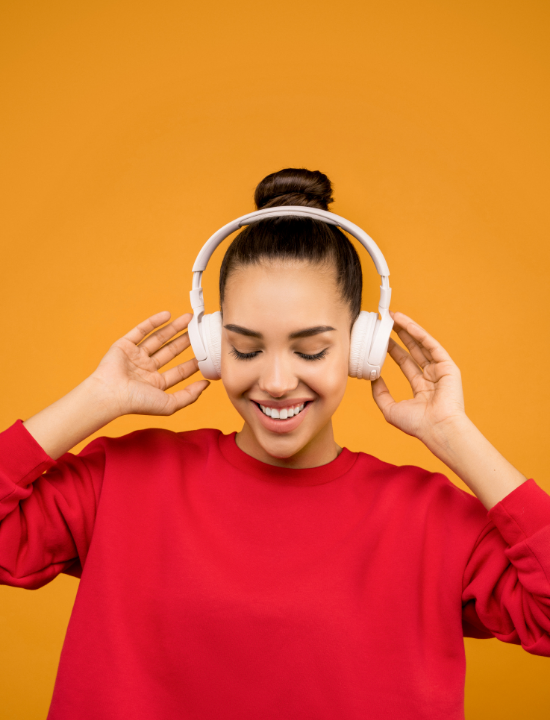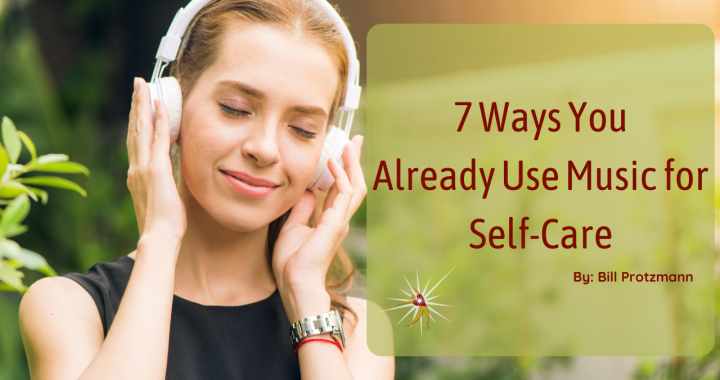This article was originally published on YourTango.com, and is republished here with permission of the author, Bill Protzmann.
Seven Ways You Already Use Music for Self Care
It’s a self-validating truth: music is medicine – for your body, your mind and your soul
Scientists call them “anecdotal evidence,” and you hear the stories all the time: Classical music makes you smarter; distance runners use music for enhanced endurance; some songs just put you in the mood.
Let’s leave the “why” aside for a moment and take a look at your natural desire for music and what happens when you hear it.
1) Your favorite love songs – the ones that really do it for you
Admit it: some of your music reaches right into your heart and unlocks all the beauty and closeness of being in love whenever you hear them. Scientists talk about dopamine but let’s be honest: don’t you really enjoy the shivers down your spine when you hear a favorite song? These tremors are actually very health-giving in ways science is just beginning to understand for things like releasing traumatic memory and you’re already getting them from your favorite love song.
2) Exercise much? To music? Go for it – even harder!
There’s a reason that your endurance improves if you work out to music – and you already know it. You probably already use it! Runners find their second wind to music, and the Spotify app has a “Running ” feature for this reason. Entraining your workout to music helps keep that part of you that wants to stop when it gets hard from being quite so present.
3) Need a good cry? Put that feeling to music.
It’s not maudlin to spin your sad music when you let the tears come – just like the sound track you use for exercise or making love, those songs that support your grief help you process the intensity of sadness. Rather than holding it all inside, it’s better to feel it fully and music has been there doing that for many thousands of years.
4) How about physical pain? Doesn’t music help you there, too?
Sometimes it seems counter-intuitive to play music when you’re in pain, but we still do it. My daughter had a number of reconstructive surgeries when she was very young, and she started asking for a CD player and headphones during recovery. I gifted her this song. We all know about David playing the harp when King Solomon got headaches. Chances are good that you already use music to soothe painful symptoms in your physical system and understand the benefits on an intuitive level.
5) What about anger? Music can help you let that sucker go!
There’s a lot of angry music in the world. Why? Because, like sadness, music is a safe way for us to feel that s**t and let it go. It’s unsafe to rage on the road or with a loaded weapon, but music can enhance anger in a safe way and let it move through you. If you already have a sound track for anger and rage you’ve got this one! Keep using it and for heaven’s sake encourage everyone you know to do it too; we need a better way to stay safer these days.
6) Jump-start your brain.
If you like listening deeply to a genre of music that’s not in your mainstream, you already get this. It doesn’t have to be Classical music; taking time to explore something new is a great way to engage that part of your brain that science says we don’t use much. It’s hard to explain, but there’s something satisfying about being a music hunter. I found the music of Tinariwen a few years back and it has been my go-to sound track when I just want “something else” – helps me shift gears in some holistic way. Can you relate?
7) What’s your happy song? The one you go to when things are great?
 Whether it’s a football fight song or your private feel-good playlist, you know how it feels when your joy is set to music, right? Like a movie without a soundtrack, turn off the music and things fall flat. Our human systems – especially joy — really resonate to music.
Whether it’s a football fight song or your private feel-good playlist, you know how it feels when your joy is set to music, right? Like a movie without a soundtrack, turn off the music and things fall flat. Our human systems – especially joy — really resonate to music.
Now: how…and why music?
We humans are vibratory beings. Atoms, cells, molecules, organs – everything about us and about our universe – vibrates. We hear and make vibration when we listen and speak. We see vibration as color. With every beat, our hearts make individual rhythm for us. The earth itself vibrates at a frequency too low for us to hear. The bodies we ride in resonate with the sound and vibration around us, and we are either in sync with our environment (which feels good!) or fighting it (which feels bad).
The vibrations of music trigger our human systems – brain chemistry mostly – and we respond: mentally, emotionally and physically. We can’t help it.
We have a natural inclination to sync our music to what our body, brain and heart need, and when we do, things can really feel better – fast.
What music is best for me to use?
You already know this: your best music is the music you already love. Play around with it – see how each of “your” songs entrains you: do you speed up, get thoughtful, feel happy, cry, relax? It’s good to know exactly which of your tunes works best for each activity in your day to day, and then dial them up to support that activity. Even if it’s unpleasant!
My wife likes to use classical music during rush hour. This stimulates her higher brain function instead of triggering her lizard brain, and that helps keep her alert and calm at the wheel. It feels good for me to know that her choice of music makes her a better, more defensive and less-rage-full driver.
In my volunteer work with at-risk people, I’ve encountered many folks with manic or schizoid symptoms who use hip hop or rap to slow their brains down enough to
Full disclosure: this is some powerful s**t.
There’s a time and a place for music as self-intervention. Rage Against the Machine lets me unpack rage, but I try not to use it when it might be unsafe, like in rush hour traffic or when other people who don’t get my music might be offended.
Be gentle with yourself.
We all have feelings that don’t feel good. You’ll find that music amplifies them really well and that those feelings will move through you and leave you, but sometimes they need a little help. My functional music playlist for grief has some heavy stuff in it, but I like to end that listening session with a happy tune to help me turn the corner back to my “normal.”
Want to be part of the music care movement? You could check out the Music Care website or sign up for lessons, but let’s leverage what you already know! Leave a comment for others after this article – nothing is as powerful as YOUR story to inspire everyone.

